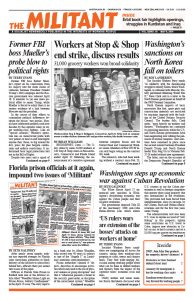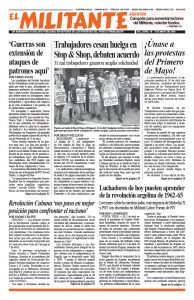The White House April 17 announced new sanctions in Washington’s decadeslong economic war against the Cuban people and their socialist revolution.
The government imposed Title III of the reactionary 1996 anti-Cuba Helms-Burton Law, which allows U.S. citizens to sue in U.S. courts companies or individuals that do business with Cuba using property that was nationalized in the revolution. This provision had been barred from implementation, since its passage, by the Clinton, Bush and Obama administrations and for the first two years under Trump.
The administration will also deny U.S. visas to anyone accused of “trafficking” in this property; tighten some restrictions on U.S. travel to Cuba; impose new obstacles to Cuba’s access to hard currency and set a $1,000 cap per quarter on remittances by Cuban-Americans to their families on the island.
The announcement was timed to coincide with the anniversary of the failed April 1961 Bay of Pigs attack. This invasion by 1,500 mercenaries armed, trained and deployed by Washington was defeated in less than 72 hours by Cuban workers and peasants who mobilized to defend their revolution.
The measures are part of Washington’s effort to blame the social crisis in Venezuela on Cuba. In announcing the new measures, Secretary of State Mike Pompeo repeated timeworn slanders that the Cuban government is a repressive dictatorship and the lie that “Cuban military intelligence and state security services today keep [Venezuelan President Nicolás] Maduro in power.”
In 2014, under the Barack Obama administration, the U.S. rulers made a tactical shift to “loosen” aspects of the U.S. embargo. This was a recognition that decades of attempts to use biting sanctions to throttle the revolution had failed. Their new approach sought to extend the reach of the U.S. dollar in Cuba and promote growth of capitalist businesses there. They hoped these steps would encourage “consumerism” inside Cuba and undermine the revolution.
Both Trump and Obama share the same long-term goal — to re-establish the grip of capitalist exploitation and U.S. imperialist control.
The U.S. government — under Democratic and Republican presidents alike —has never forgiven the working people of Cuba for overthrowing the U.S.-backed Fulgencio Batista regime in 1959. Nor has it given up on trying to overturn the revolution.
The U.S. rulers especially hate Cuba’s living example that workers and farmers can take political power and open the road to deeper inroads on capitalist property relations.
US imperialist arrogance
Fidel Castro told the U.N. General Assembly in September 1960 that when the Cuban government nationalized U.S.-owned land and corporations, advancing workers control, the U.S. government demanded, “Prompt, adequate, and effective compensation.”
“That means,” Castro said, “Pay this instant, in dollars and whatever we ask.”
The Cuban revolutionary government did offer compensation. “We simply proposed to pay for it in 20 years,” Castro said, “by bonds that would mature in 20 years, at 4.5% interest amortized annually.” Washington refused.
Even before the Helms-Burton Title III lawsuits are made legal, the State Department says that nearly 6,000 claims had been certified by the Treasury Department as eligible to go to court.
The U.S. government also plans to implement the act’s Title IV, which denies entrance to the U.S. to anyone Washington says is involved with confiscated properties. This is intended to send a message to U.S. competitors in Britain, France, Canada and other countries that have investments in Cuba.
These governments have denounced Washington’s moves.
At a meeting in Florida to commemorate the Bay of Pigs assault April 17, National Security Adviser John Bolton made it clear that new sanctions against ships and maritime companies that transport oil from Venezuela were primarily aimed at weakening Cuba.
Some 40 ships and six companies that have been shipping oil from Venezuela to Cuba are now sanctioned. Venezuelan oil shipments to other countries, such as India, China and Russia, have not faced the same restrictions.
The Cuban government said in an April 17 statement that Washington knows “Cuba has no troops nor does it participate in military or security operations in Venezuela, even though it is a sovereign right of two independent countries to determine how to cooperate in matters of defense, which the United States has no right to question.”
The overwhelming majority of the roughly 20,000 Cuban internationalist volunteers in Venezuela today are health care workers, teachers, sports instructors and coaches “and 60 percent are women,” the statement said.
The statement quoted a speech by Cuban leader Raúl Castro April 10. “In 60 years of facing aggression and threats, we Cubans have demonstrated an iron willingness to resist and overcome the most difficult circumstances,” he said. “Despite its immense power, imperialism does not have the capability to break the dignity of a united people, who are proud of their history and the freedom won at the price of so much sacrifice.”
Samantha Hamlin, Socialist Workers Party candidate for mayor of Troy, New York, who participated in last year’s May Day Brigade in Cuba, condemned Washington’s moves.
“For decades the U.S. rulers have tried to cripple the Cuban Revolution and make Cuba’s workers and farmers pay for making a socialist revolution,” Hamlin said. “And for 60 years the Cuban people have served as an example to working people worldwide. We demand Washington end its economic war against Cuba!”

